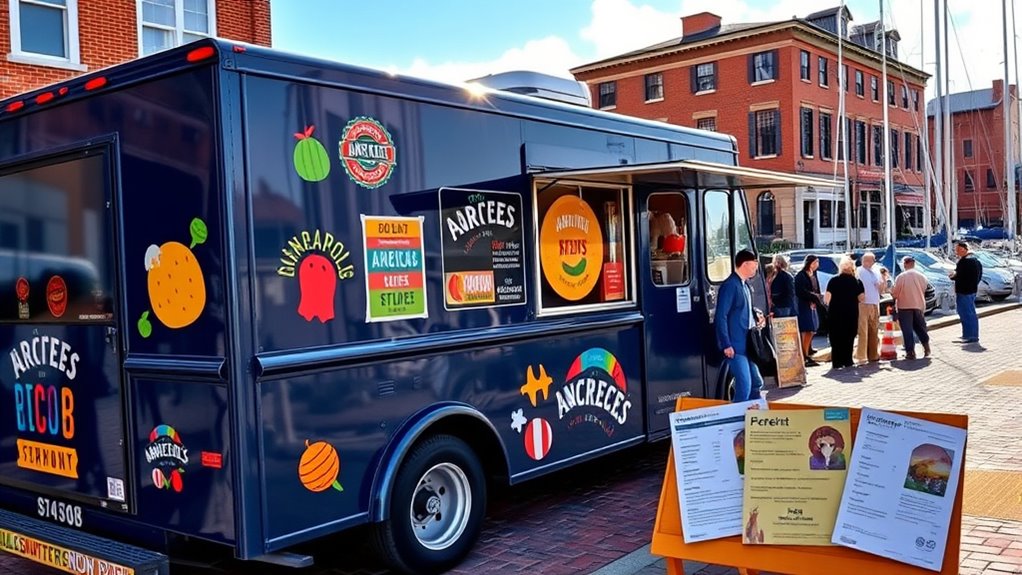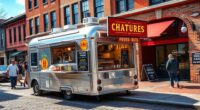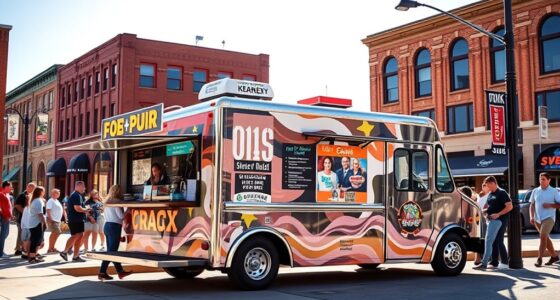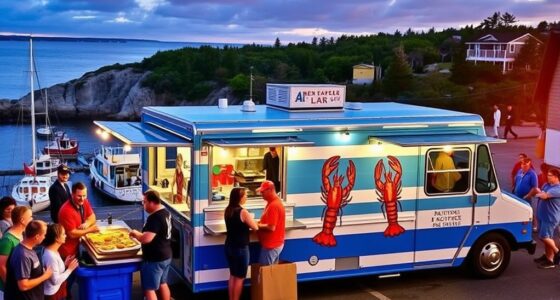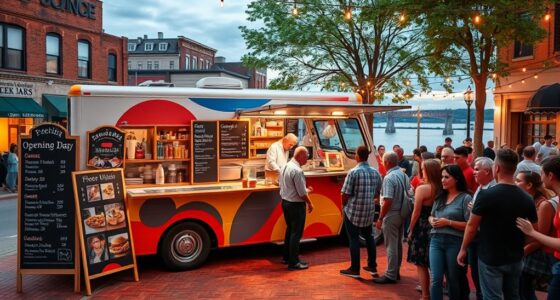To open a food truck in Annapolis, you need to secure permits like a Temporary Food Service License, which is issued about two weeks before your events, and guarantee your mobile unit passes structural and safety reviews. Expect startup costs from $50,000 to $250,000 and plan for regular expenses like fuel and permits, which range around $1,800 to $2,000. Choose high-traffic locations and develop a compliant, eye-catching menu. Effective marketing with social media and local partnerships will boost your success—continue exploring the details to get started smoothly.
Key Takeaways
- Obtain a Temporary Food Service License at least 2 weeks before events, including inspection and submission of detailed plans.
- Startup costs range from $50,000 to $250,000, covering vehicle, equipment, permits, and initial inventory.
- Focus on high-traffic areas like West Street and waterfront, utilizing community events and festivals for visibility.
- Submit menus for health department approval with HACCP plans, ensuring ingredients and storage meet safety standards.
- Use social media, locator apps, and local partnerships to market your food truck and attract customers effectively.
Navigating the Permitting Process and Licensing Requirements
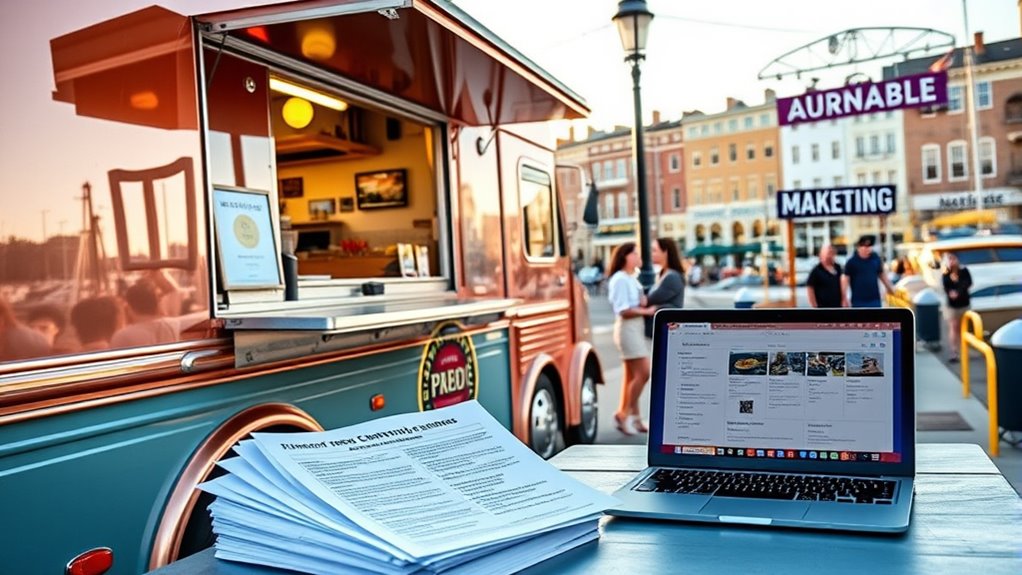
Managing the permitting process and licensing requirements is essential for operating a food truck in Annapolis. You’ll need a Temporary Food Service License at least two weeks before your event, submitting an application with details like location, dates, foods, and contact info. Late applications incur penalties, so plan ahead. The standard fee is $114, with discounts for nonprofits. Submit your application and payment by 12 p.m. two business days before the event, or it will be rejected. For mobile units, you must pass structural and HACCP plan reviews, including submitting floor plans, equipment lists, menu, sink locations, VIN, and workers’ comp documents. You’ll also need a physical inspection of your mobile unit and display your license prominently to comply with licensing and safety standards. Additionally, application deadlines are strictly enforced, so timely submission is critical to avoid penalties or delays. Incorporating AI-driven data analytics can help streamline your permit tracking and compliance processes, ensuring you stay on top of regulatory requirements.
Understanding Costs and Fee Structures for Mobile Food Operations
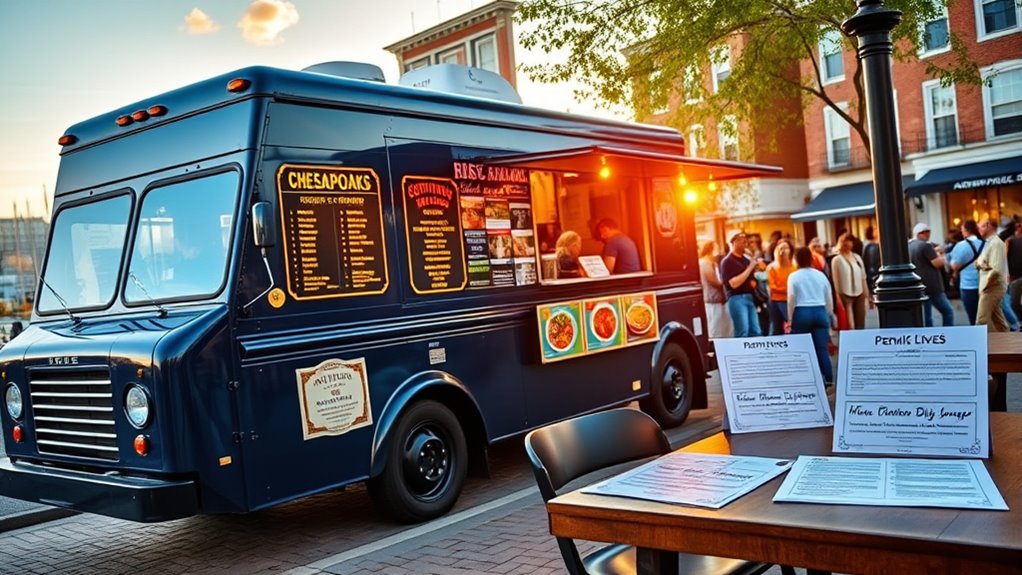
Understanding the costs and fee structures involved in mobile food operations is essential for budgeting and planning your food truck business. Startup costs typically range from $50,000 to $250,000, covering vehicle purchase, equipment, and permits. The truck itself costs between $40,000 and $150,000, depending on newness and purchase method. Initial licensing fees vary but average around $1,800 to $2,000, with some cities charging much higher. Startup inventory costs are usually $2,000 to $3,000, and basic serveware is about $300, plus technology like POS systems. Recurring costs include fuel, maintenance, supplies, insurance, and marketing. Permitting fees in Maryland generally fall between $1,800 and $2,000, but can be higher depending on local regulations. Proper planning can help ensure all expenses are accounted for and prevent unexpected costs from impacting your budget. Additionally, understanding regulatory requirements such as health codes and zoning laws is crucial for smooth operations.
Choosing and Securing Prime Locations and Operating Bases
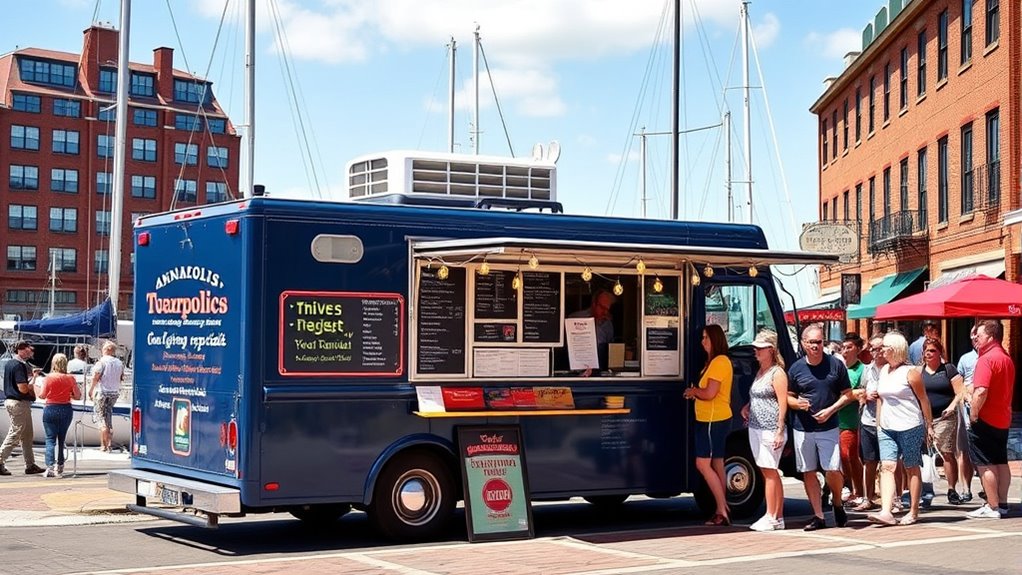
Choosing the right locations and operating bases is essential for maximizing your food truck’s visibility and sales in Annapolis. Focus on high-traffic areas like West Street, Dock Street, and Ego Alley, especially near tourist spots and waterfronts. Community events such as Food Truck Fridays and local festivals attract large crowds, offering great temporary spots. Corporate parks and business districts are ideal for lunchtime traffic and catering. Secure spots with easy access to utilities, waste disposal, and customer flow, including food truck gathering points or delivery zones. Be mindful of zoning laws and permits from city and county authorities, ensuring compliance with health and fire regulations. Building relationships with property owners and local event organizers helps you access prime spots consistently and boost your visibility. Additionally, obtaining permits from the local health department and fire marshal is crucial to operate legally and safely in Annapolis. Establishing a reliable supply chain ensures consistent inventory and smooth operations, which is vital for maintaining customer satisfaction.
Developing a Menu That Complies With Health Regulations and Stands Out
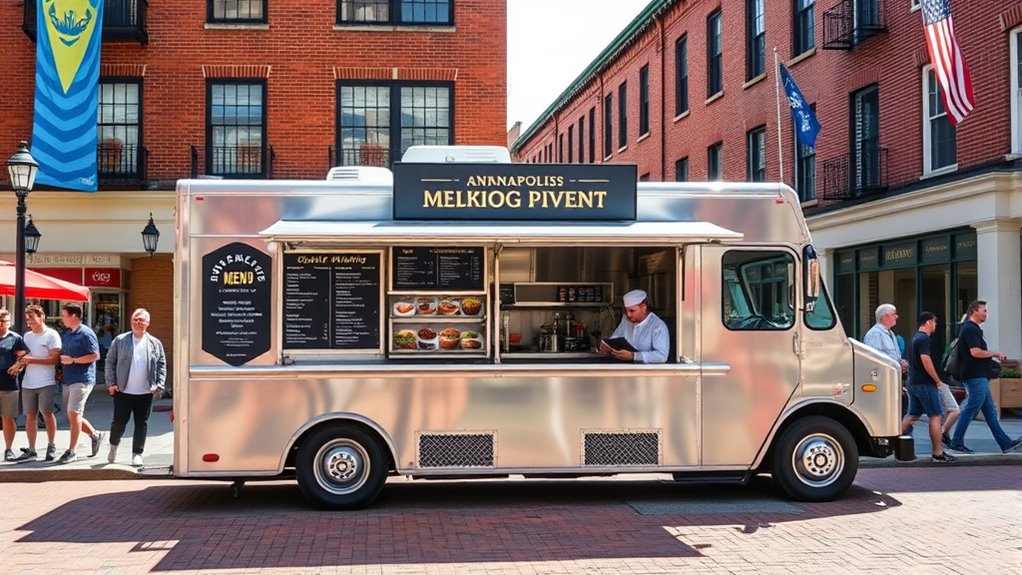
Developing a menu for your food truck involves more than just selecting tasty items; it requires careful planning to guarantee compliance with health regulations while making your offerings stand out. You must submit your menu for review by the Anne Arundel County Health Department and include a HACCP plan highlighting critical safety points. Your menu should feature:
- Only ingredients from approved sources, with receipts kept for up to 90 days
- Items that can be stored and served at safe temperatures using compliant equipment
- Limited cross-contamination risks by design, with separate utensils and equipment
- Quick-to-prepare, innovative dishes that fit space and equipment constraints
- Proper food storage is essential to prevent spoilage and ensure safety during operations.
Menus must be reviewed and approved prior to operation to ensure they meet all safety and sanitation standards.
Strategies for Marketing and Ensuring Ongoing Compliance
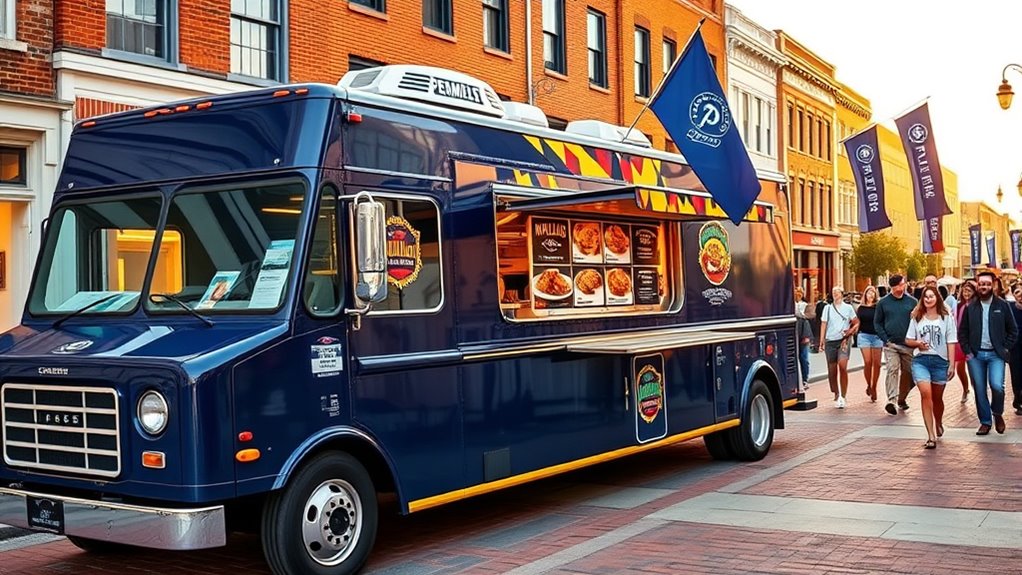
To keep your food truck thriving, you need a solid plan for marketing and ongoing compliance. Leverage social media platforms like Instagram, Facebook, and Twitter for updates on locations, specials, and events to stay connected with customers. Create a consistent visual identity—logo, colors—that builds recognition across all channels. Use food truck locator apps to update your location and menus, engaging users with reviews and notifications. Offline, participate in local events, partner with nearby businesses, and use flyers, posters, and branded merch to boost visibility. Regularly review permits and licenses, train staff on food safety, and keep detailed records for inspections. Additionally, staying informed about local health and safety regulations and maintaining open communication with regulatory agencies can help prevent violations and ensure your business remains compliant and reputable. Incorporating predictive analytics can also help anticipate customer trends and optimize your inventory and marketing efforts effectively.
Frequently Asked Questions
Can I Operate a Food Truck Without a Dedicated Commissary in Annapolis?
You can’t operate a food truck without a dedicated commissary in Annapolis unless you’re only at temporary events for 30 days or less. The health department requires a compliant food prep and storage facility for regular operation. Shared kitchen spaces can work if they meet all safety standards. Operating without an approved commissary risks permit denial, revocation, and legal penalties, so you must confirm proper facilities are in place before starting your food truck business.
What Are the Specific Insurance Requirements for Mobile Food Units in Maryland?
You need to meet specific insurance requirements for your mobile food unit in Maryland. This includes obtaining commercial auto insurance with at least $30,000 per person and $60,000 per accident liability coverage. You should also get general liability, workers’ compensation if you have employees, and food liability insurance to cover foodborne illnesses. Additional policies like equipment breakdown and business interruption can also protect your business, helping you stay compliant and safeguarded.
How Long Does the Entire Permitting Process Typically Take?
The permitting process usually takes several weeks to over a month. You’ll need to submit detailed plans for review, schedule vehicle and fire inspections, and get approvals from multiple agencies. Delays can happen if your paperwork is incomplete or inspections require re-dos. Since each step depends on department responsiveness, plan for a total timeline of about four to six weeks, sometimes longer if unforeseen issues arise.
Are There Restrictions on Operating Hours or Days for Food Trucks in Annapolis?
So, you’re wondering if Annapolis has a “food truck curfew,” huh? Well, surprise! They do. You can’t linger longer than 30 minutes in residential zones outside the historic district, and commercial spots have their own rules—the 300-foot proximity rule, for instance. Operating hours are also tied to location and special event permits. Basically, if you’re planning to serve grub, you’d better read the fine print or risk becoming a midnight snack for the law.
What Steps Should I Take if I Receive a Violation Notice During Inspection?
When you get a violation notice during inspection, you should review the violations carefully and understand the specific issues. Immediately address the most critical problems affecting safety, document all corrections, and contact the inspecting authority to clarify next steps or schedule re-inspection. Make sure all necessary permits are updated, train your staff on compliance, and keep records organized. Prompt action helps you avoid fines, suspension, or closure of your food truck.
Conclusion
Starting your food truck in Annapolis can be a rewarding adventure if you stay informed and proactive. Remember, “the early bird catches the worm,” so plan ahead, secure the right permits, and craft a standout menu. With careful location choices and smart marketing, you’ll build a loyal customer base. Keep your focus on compliance and quality, and your food truck journey will be both successful and enjoyable. Success favors the prepared!
